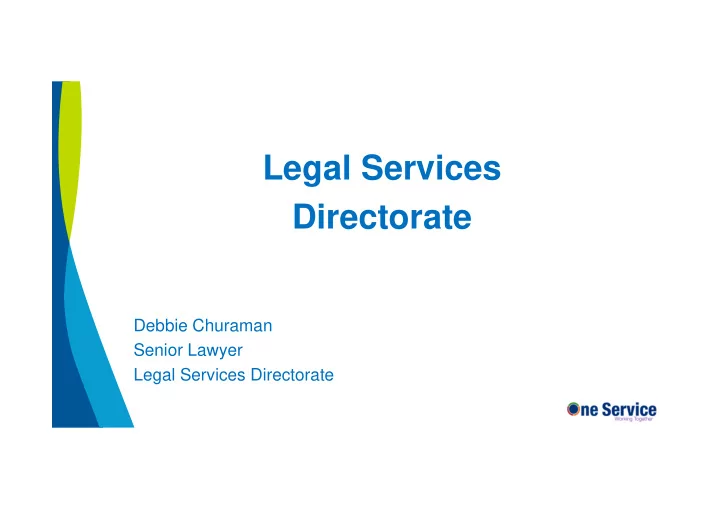

Legal Services Directorate Debbie Churaman Senior Lawyer Legal Services Directorate
Referrals • Insolvency Service • Companies House • Employment Agent Standards Inspectorate • BEIS Regulatory Teams
Stats Prosecutions April 2018 – March 2019: 144 defendants prosecuted 85% of defendants pleaded guilty 34 disqualification orders (Section 2 CDDA) were ordered for all cases prosecuted. Confiscation orders: 5 orders made totalling £235,502 Civil disqualifications (Section 6 CDDA) since June 2018: 7 disqualifications orders and 45 undertakings.
Code for Crown Prosecutors • Issued by the Director of Public Prosecutions (DPP) under Section 10 of the Prosecution of Offences Act 1985. • Governs all prosecution decisions and prosecution bodies. • Two stage test: Evidential Stage – sufficient evidence for a realistic prospect of conviction? Public Interest Stage – prosecute unless factors against prosecution outweigh those in favour.
The Evidential Stage: The Burden and Standard of Proof • Burden of Proof : The Prosecution have to prove the offence has been committed. • Standard of Proof: When making a decision to prosecute, there must be a realistic prospect of conviction. Once proceedings have been initiated, the offence must be proved ‘beyond a reasonable doubt’. Contrast standard in civil cases: on a balance of probabilites
The Public Interest Stage: Public Interest Factors • How serious is the offence committed? • What is the level of culpability of the suspect? • What are the circumstances of and the harm to the victim? • Was the suspect under the age of 18 at the time of the offence? • What is the impact on the community? • Is a prosecution a proportionate response?
Acting as a Prosecution Witness • Explaining technicalities and terminology • Evidential issues – Continuity • Witness Statement
Disclosure • The Criminal Procedure and Investigations Act 1996 (CPIA) • The obligations under CPIA are underpinned by the Code of Practice (“The Code”) under Part II of the Act • The Attorney General’s Guidelines on Disclosure (“The Guidelines”) reissued in 2013 • Supplementary Guidelines issued by the Attorney General dealing with the Disclosure of Digitally Stored Material (“Digital Material”) gives guidance on dealing with digital material • The Protocol for the Control and Management of Unused Material in the Crown Court (“The Protocol”) gives guidance to the Judiciary on managing the process • Criminal Procedure Rules 2015
Headlines • Every person has the right to a fair trial. • Disclosure is integral to ensuring that right. • Criminal investigations in our cases usually result in large quantities of material being gathered, only some of which is used in the prosecution case. • The remaining material (“unused material”) may be significant to a defendant in either supporting the defence case or in undermining the prosecution case. • It is essential that a defendant has access to this material as provided by the relevant legislation.
The disclosure test Material which “might reasonably be considered capable of undermining the case for the prosecution against the accused, or of assisting the case for the accused”
Recommend
More recommend